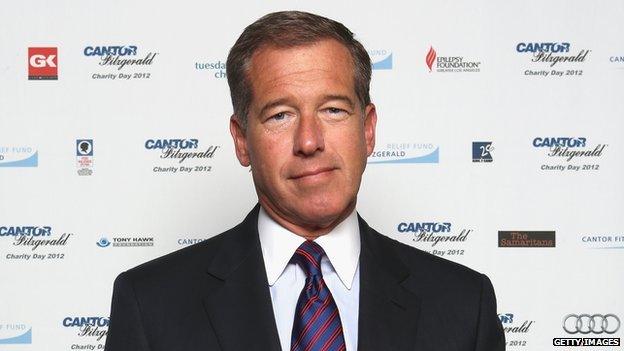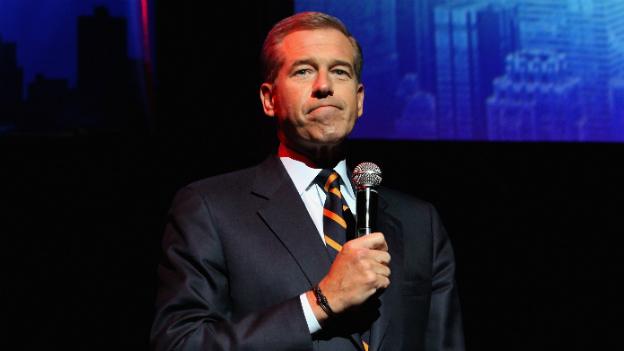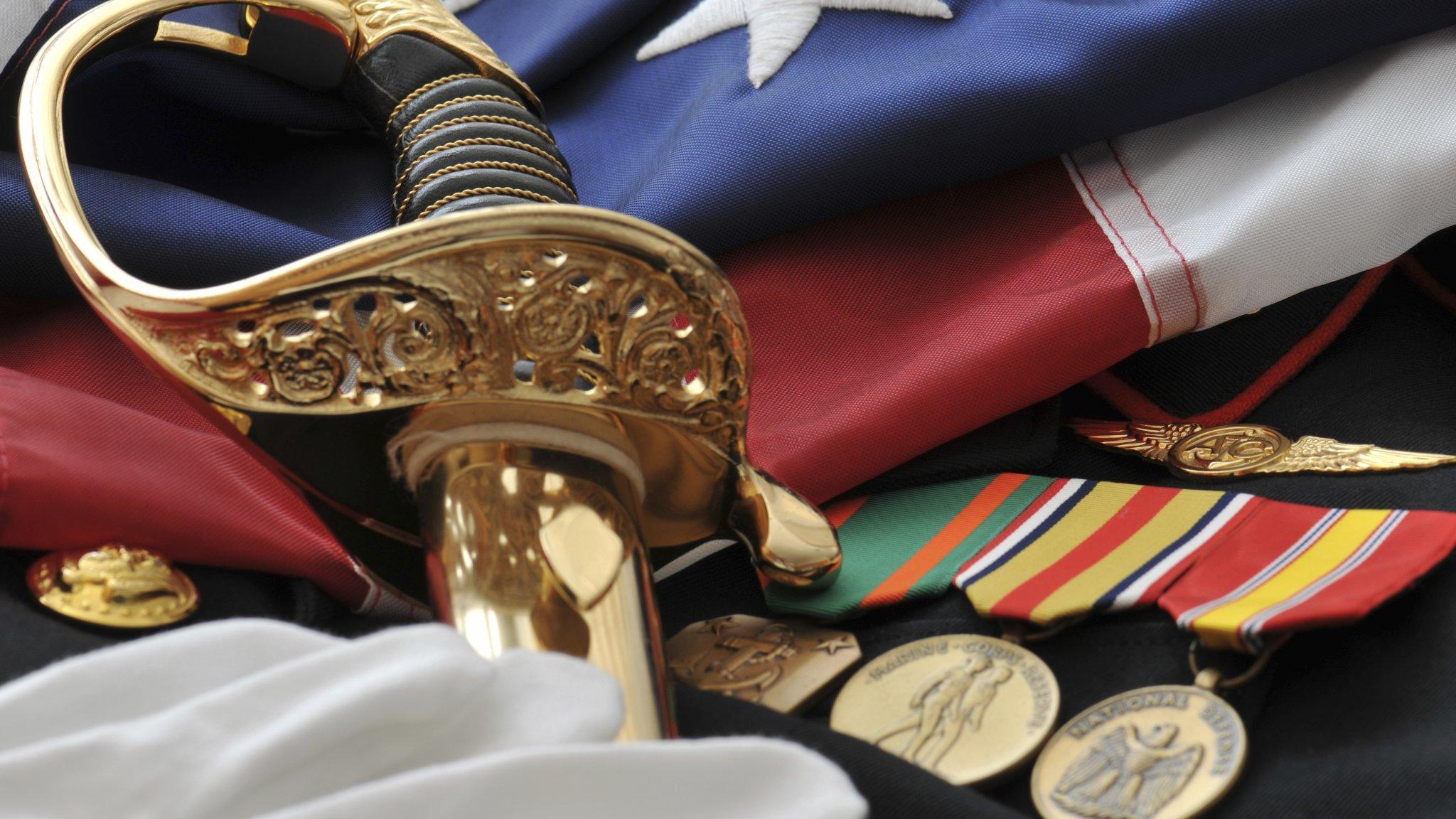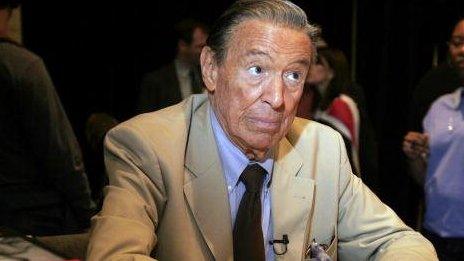Is Brian Williams tale a case of 'stolen valour'?
- Published
- comments

The controversy surrounding NBC anchor Brian Williams and his "misremembered" involvement in the downing of a US helicopter during the Iraq War in 2003 continues to grow.
Ever since the nightly news anchor apologised on Wednesday for what he said was a "terrible mistake" due to the "fog of memory over 12 years", more details have emerged about Mr Williams's progressively more exaggerated claims.
Conservative bloggers and columnist have been quick to point out the changing version of events - captured in interviews with David Letterman, external and Alec Baldwin, external, among others - from his being in a helicopter following one that was shot down by Iraqi forces to being in the helicopter itself and ending up stranded in the desert for days.
According to military personnel in the area at the time who were interviewed, external by Stars and Stripes newspaper, Mr Williams didn't arrive at the location of the downed helicopter until nearly an hour after the attack.
Don Kaplan, a columnist for New York Daily News, finds, external Mr William's spotty-memory explanation to be questionable at best - and his recent apologies still don't mesh with on-the-ground reports.
"We're talking about a rocket propelled grenade slamming into the side of a helicopter as it flies over a battlefield," he writes. "So what if it was 12 years ago? I can remember getting hit in the head with a rock by a kid in third grade."
He concludes: "As journalists, the truth is the only currency any of us have, and Williams's mea culpa was a pile of funny money."
The fiercest reaction to the Williams story, however, has come from online conservatives. Many conservative writers have accused Williams of "stolen valour" - a charge levelled at individuals who make false claims of war heroism in order to bask in the resulting adulation and privileges. They contend that the episode has permanently damaged Mr Williams credibility and should lead to his resignation.
"Williams' 12-year lie is a disaster for the anchor and for the network that made him the face of its news division," writes, external Breitbart's John Nolte. "Obviously no one at NBC News bothered to check a story that was just too good to check. Worse, this will only compound the credibility and ratings issues that have damaged the NBC News brand for a few years now."
Brian Williams: "I made a mistake in recalling the events of 12 years ago"
"How can Brian Williams hold such a position, get caught doing such a thing, and not immediately resign to save his colleagues the agony?" he tweets, external.
Ace of Spades HQ, a conservative blog, says, external Mr Williams was engaging in "an age-old reportorial practice called lying to advance an agenda".
"The agenda here was dressing up a soft, delicate little boy into a the sort of iron-stubbled man who looks like he belongs on a battlefield," Ace writes.
Part of the reason the revelations about Williams have been met with particular glee, external among conservative bloggers could be that the NBC anchor has been outspoken in his criticism of online journalism standards in the past.
"All of my life, developing credentials to cover my field of work, and now I'm up against a guy named Vinny in an efficiency apartment in the Bronx who hasn't left the efficiency apartment in two years," Williams said, external in a 2007 speech. "On the Internet, no one knows if you've been to Ramadi or you've just been to Brooklyn and have an opinion about Ramadi," said Williams.
According to the Atlantic's David Frum, the Williams episode exposes an ongoing double-standard in the news business.
"In media, plagiarism and fabulism are strictly forbidden if you are under 30 and not very well known," he tweets, external. "Otherwise, it's a speeding ticket."
Of course this is far from the first time a prominent US public figure has become embroiled in questions about wartime dangers. In 2008 then-presidential candidate Hillary Clinton was questioned, external for asserting that her plane was under sniper fire when she visited Bosnia as first lady in 1996.
In the 2004 presidential race, numerous conservative activists cast doubt Democratic candidate John Kerry's Vietnam War record.
Just last month, following the surprise success of American Sniper, discrepancies in some of the stories recounted by the central figure in the film - US soldier Chris Kyle - resurfaced.
The ideological shoe was on the other foot in that case, as liberals accused Kyle of being a serial exaggerator and braggart and used it to question the credibility of the Oscar-nominated film.
The Williams story is different, however, because of this currency of truth on which the media depends.
"The standards of veracity and accuracy demanded of a network news anchorman are much higher than those expected of a politician," writes, external the Daily Beast's Lloyd Grove. The same could be said for a now-deceased Navy Seal-turned-author like Kyle.
As conservative media consultant Frank Luntz tweets, external: "Brian Williams is also managing editor at NBC News. In other words: He verifies facts and stories' credibility before they're shown on-air."
Mr Williams might hold on to his job through this controversy, but these sorts of things have a way of looming over journalists for their entire career.
As it turns out, the helicopter Brian Williams was in didn't crash and burn. His professional reputation, on the other hand, may not be so lucky.
- Published5 February 2015

- Published10 December 2014

- Published23 December 2013
